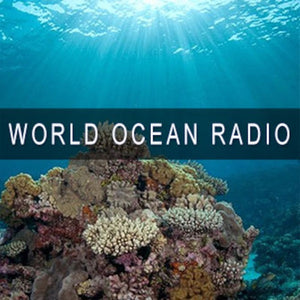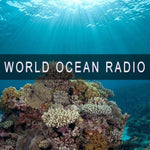
About
World Ocean Radio is a weekly series of five-minute audio essays on a wide range of ocean topics. Available for syndicated use at no cost by college and community radio stations worldwide.
World Ocean Observatory
30 Episodes
Episodes
This week on World Ocean Radio we're exploring an extraordinary museum in Marrakesh, Morocco that celebrates the long history of the sustenance and management of water in the region, from... more
In September, Morocco became the 60th country to ratify the UN High Seas Treaty, designed to protect marine biodiversity and establishing new high seas marine protected areas: a precedent and... more
A special 4-minute reading of "Christmas at Sea", an evocative poem written by Robert Louis Stevenson in 1883. Stevenson, the son of a lighthouse engineer, had intimate, first-hand knowledge of... more
This week on a new 5-minute episode of World Ocean Radio we're discussing the word "Hydromancy", its meaning and signs, water in its many forms, and its implication for our... more
This week we are reporting on COP30 (the 30th Conference of the Parties) hosted in Belem, Brazil. The annual gathering is a response to the challenges of climate change; there... more
This week on World Ocean Radio we are reflecting on a time and place no longer familiar: traditions and accepted norms unrecognized, histories forgotten, futures uncertain. How do we recapture... more
Devastating weather and water events abound worldwide, causing havoc in ports, waterfronts, and elsewhere. These are neither new nor are they going away any time soon. How do we rebuild... more
This week Peter Neill, founder of W2O and host of World Ocean Radio, argues that wars, particularly those in the Middle East, are all about the water: rivers, access to... more
The most substantial by-product of human consumption is waste, thus far omitted on balance sheets and in calculation of individual and gross national product. Waste comes in many forms: polluted... more
This week on World Ocean Radio, our host Peter Neill is thinking about the word "solastalgia", described as a deep grief over changing landscapes that were once familiar; feeling ‘homesick’... more
This week on World Ocean Radio we are discussing the September 2025 news that Morocco has become the 60th nation to ratify the High Seas Treaty, a two-decades long process... more
Nature is a significant factor on the global balance sheet, and the cost of nature loss affects many key economic sectors. Denial or exclusion of nature's true value is flawed... more
“Climate change has been one the greatest failures of risk management in modern history.” So states the Back to Blue Initiative, an Economist and Nippon Foundation project. A recent article... more
Water scarcity is among the foremost challenges to national and regional financial security and public health in India. This week on World Ocean Radio we outline a sampling of water... more
This week on World Ocean Radio we're discussing a news story provided by Inside Climate News that highlights Corpus Christi, Texas and the intensively water-dependent industrial projects there that, by... more
This week on World Ocean Radio Peter Neill shares thoughts and readings from Joseph Conrad and from UK writer Adrian Morgan's recent article entitled, “How Many Ways Has Joseph Conrad... more
Peatlands, bogs, swamps, and wetlands are uniquely biodiverse natural spaces: soft coastal barriers that make immeasurable contributions to the health and sustainability of human endeavor. Left unprotected, their consumption contributes... more
This week on World Ocean Radio we're discussing the "Mind Map of Blue Ocean Leadership,” a chart developed by a global constituency of business experts, graphed to show existing leadership... more
This week Peter Neill is reading from an article written by representatives of the UN IOC and the Natural Science Foundation of China, based on the concept of ocean as... more
From an island perch in Maine, host of World Ocean Radio Peter Neill recently witnessed a full moon rising over the Atlantic Ocean. The silent, majestic way that it rose... more
This week: Is there no time left to explore other ways of seeing, being, solving, and surviving? Where can we place our energy and imagination to serve as functions of... more
On June 8th, World Ocean Day, the new film OCEAN, presented by Sir David Attenborough, debuted in theatres and maritime museums around the world, a celebration of the ocean’s beauty... more
This week, host Peter Neill reads verbatim an AI response to an action posed. He asked Chat GPT to write 750 words in the style of Peter Neill on World... more
Why is there so much war? So much strife in the Middle East: what are we fighting for? This week Peter Neill,founder of W2O and host of World Ocean Radio,... more
This week we're discussing the circulation of water worldwide, and the importance of our waterways--canals in particular--as the great highways and distribution centers of our busy lives, now storing and... more
This week on World Ocean Radio we are discussing the Ocean Literacy movement and the need for more ocean science and fresh water understanding in the classroom. Ocean Literacy is... more
Apprenticing has long been thought of as a term to describe someone working beside a master craftsperson to learn a trade and to refine a professional skill: whether it be... more
Each year on June 8th we celebrate World Ocean Day to recognize our relationship with the ocean, the vast watery world that covers 71% of our planet. Despite gains in... more
We live in a world of invisible circulation. It swirls in us and around us at all times, transporting and exchanging all things good and bad, some natural, some man-made.... more
Will the children set us free? Has it come to that? Have we abandoned the future for our children to solve, leaving them accountable for what we have failed to... more



